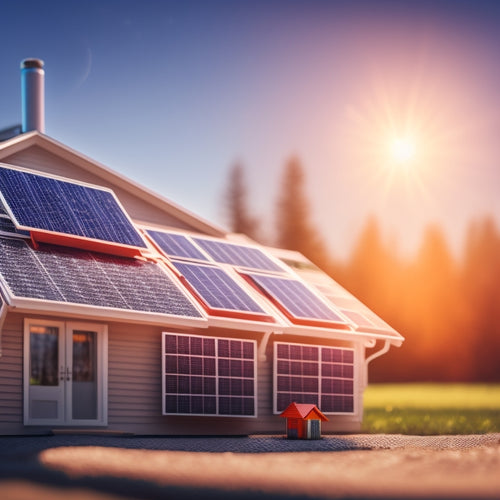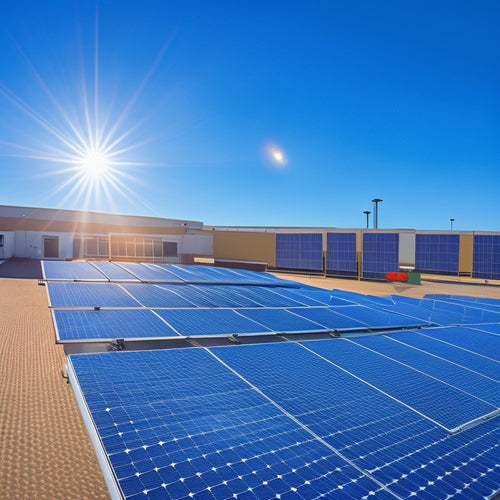
Rooftop Solar Systems
Share
By installing a rooftop solar system, you can greatly reduce your reliance on traditional energy sources, cutting your monthly energy bills by 50% or more while achieving energy independence through self-generated clean energy. You'll also enhance your property value instantly, increasing its resale value by up to 17%. To maximize energy production, ideal panel placement and regular maintenance are essential. Shading analysis is also key to understanding your roof's energy harvesting potential. And, with government incentives like the 26% federal tax credit, going solar is more accessible than ever. Now, take the next step to revealing the full benefits of rooftop solar systems.
The Essentials
- Rooftop solar systems reduce energy costs by 50% or more, leading to significant savings on monthly energy bills.
- Installation of rooftop solar systems enhances property value immediately, increasing resale value by up to 17%.
- Optimal panel placement is crucial for maximizing energy production, with south-facing roofs at angles of 15 to 45 degrees yielding peak energy output.
- Shading analysis is critical for solar system energy output, considering factors like tree canopies, roof orientation, and obstructions.
- The US government offers a 26% federal tax credit for rooftop solar adoption, reducing upfront costs and making solar more accessible to homeowners.
Cut Energy Bills Dramatically
You can greatly reduce your energy expenditure now by utilizing the power of rooftop solar systems.
In addition, with the rising cost of traditional energy sources, it's crucial to investigate alternative options, such as Renewable Energy Solutions, to minimize your reliance on the grid.
By doing so, you'll lower your monthly costs and enjoy considerable savings over time.
With a well-designed solar system, you can cut your energy bills dramatically, freeing up more of your budget for other important expenses.
Reduce Energy Expenditure Now
Rooftop solar systems offer a solution to homeowners' growing concern about rising energy costs, allowing them to reduce their energy expenditure now and cut energy bills dramatically.
By utilizing renewable energy from the sun, you can break free from reliance on traditional energy sources and take control of your energy costs. With solar financing options available, you can shift to a cleaner, more sustainable energy solution without breaking the bank.
As energy storage systems continue to advance, rooftop solar systems are becoming even more efficient and effective. Renewable energy trends indicate a shift towards decentralized power generation, and rooftop solar systems are at the forefront of this movement.
By installing a rooftop solar system, you'll not only reduce your energy expenditure but also increase your energy independence. With the ability to generate your own clean energy, you'll be less susceptible to price hikes and grid outages.
Lower Monthly Costs
One of the most significant benefits of installing a rooftop solar system is the substantial reduction in monthly energy costs. You'll be generating your own clean energy, which means you'll be relying less on the grid and reducing your energy bills dramatically.
With a rooftop solar system, you can cut your energy expenditure by up to 50% or more, depending on your energy usage and the size of your system. By adopting Renewable Energy Solutions, you'll be joining the movement towards a more sustainable future, and with the help of Off Grid Power, you'll be prepared for any power outages that come your way.
As you produce your own energy, you'll be reducing your reliance on the grid, achieving energy independence, and enjoying lower monthly costs. This means more money in your pocket and a significant reduction in your carbon footprint.
Boosts Property Value Instantly
You'll find that installing a rooftop solar system instantly increases your property's worth, as it becomes a highly desirable feature for potential buyers.
In fact, studies have shown that properties with solar systems sell for higher prices than those without, resulting in a higher resale value.
With top residential solar roofing solutions like those offered by Tesla and Sunrun, homeowners can enjoy efficient and durable systems that not only reduce energy bills but also enhance property value.
Increased Property Worth
Installing a rooftop solar system can greatly enhance your property's value, often instantaneously. This increase in value can be attributed to the numerous benefits that come with solar panel installation.
During the installation process, you'll have various financing options to choose from, allowing you to find a plan that suits your budget. Once installed, you'll enjoy long-term savings on your energy bills, thanks to the free energy generated by the sun.
The environmental impact of solar energy is also a major selling point, as it reduces your reliance on fossil fuels and contributes to a cleaner environment.
In terms of aesthetic considerations, modern solar panels are designed to be sleek and unobtrusive, blending seamlessly into your roof's design. Additionally, local regulations often incentivize homeowners to switch to solar energy, providing extra motivation to make the switch.
With regular maintenance tips and advancements in technology, your solar system will continue to perform efficiently, providing you with energy independence and peace of mind.
According to homeowner experiences, the increased property worth that comes with solar panel installation is a significant advantage, making it a worthwhile investment for those seeking freedom from energy bills.
Higher Resale Value
Numerous studies have consistently shown that rooftop solar systems can enhance your property's resale value by up to 17%. This significant increase is a direct result of the growing demand for sustainable living and energy independence.
As a homeowner, you're not only reducing your carbon footprint but also making a smart investment in your property.
When you install a rooftop solar system, you're increasing your property's appeal to potential buyers who are willing to pay a premium for eco-friendly features. In fact, a study by the National Renewable Energy Laboratory found that for every dollar saved on energy costs, your property value increases by $20.
This means that the installation costs of a rooftop solar system can be recouped through higher property value, making it a worthwhile investment.
In today's market, buyers are looking for homes that offer energy efficiency and sustainability. By installing a rooftop solar system, you're catering to this market demand and setting your property apart from others.
This increased appeal can lead to a faster sale and a higher selling price, giving you a significant return on your investment.
Maximizes Energy Harvesting Potential
When you design a rooftop solar system, you're aiming to maximize energy harvesting potential.
Understanding the importance of renewable energy solutions and how they can reduce your energy bills and carbon footprint is essential in this process.
To achieve this, you'll need to identify the best panel placement on your roof, considering factors like shading, orientation, and roof size.
Optimal Panel Placement
You'll want to position your solar panels strategically to maximize energy harvesting potential. To achieve this, consider the panel orientation and installation techniques that work best for your roof's unique characteristics.
For instance, a south-facing roof with an angle between 15 and 45 degrees is ideal for peak energy production. Guarantee peak spacing between panels to allow for airflow and minimize shading.
Weather considerations, such as high winds or heavy snowfall, should also influence your installation design. Additionally, assess your roof's structural integrity to confirm it can support the weight of the panels.
Familiarize yourself with local regulations and building codes to avoid any compliance issues. Proper panel maintenance is vital for energy efficiency, so consider the ease of access for future cleaning and repairs.
Efficient Energy Conversion
Optimizing panel placement is just the first step in releasing your rooftop solar system's full potential.
Now, it's time to focus on efficient energy conversion to maximize your energy harvesting potential. Your solar technology's conversion rates directly impact your system's overall performance. High-efficiency panels can greatly enhance your energy output, making the most of the available sunlight.
Proper installation methods, such as guaranteeing ideal panel angles and minimal shading, also play a vital role in improving panel performance. Effective grid integration and smart maintenance practices help maintain your system's energy efficiency over its lifespan.
By choosing a rooftop solar system, you're not only utilizing renewable resources but also contributing to environmental benefits like reduced carbon emissions. Additionally, a well-maintained system guarantees system longevity, providing you with a reliable source of clean energy for years to come.
Assess Your Roof's Shading
You'll need to assess your roof's shading patterns to determine how they'll impact your solar system's energy output. By analyzing the path of the sun and the shadows cast by surrounding objects, you'll be able to identify areas that receive partial or full shade throughout the day.
For instance, understanding energy efficiency is vital when evaluating the impact of shading on your solar system. Additionally, it's important to take into account the role of green technology in mitigating the effects of shading.
Tree shade, in particular, can greatly reduce energy production, so it's important to evaluate its impact on your roof.
Shading Patterns Revealed
Shading patterns on your roof can greatly impact the performance of your rooftop solar system. A thorough shading analysis is vital to identify areas that receive inadequate sunlight exposure.
You'll want to assess the orientation and angle of your roof, as well as the presence of obstructions such as vents, skylights, or chimneys. Additionally, consider the surrounding environment, including neighboring buildings, trees, and other structures that may cast shadows on your roof.
To conduct a shading analysis, you can use online tools or consult with a solar professional. These resources can provide detailed reports on the shading patterns on your roof, including the amount of sunlight exposure each area receives throughout the day.
This information is essential for determining the best placement and configuration of your rooftop solar system. By understanding the shading patterns on your roof, you can maximize your system's energy output and enjoy the freedom that comes with generating your own clean energy.
Tree Shade Impact
As trees surrounding your property grow, their canopies can cast significant shadows on your roof, impacting the performance of your rooftop solar system. The shading effects of trees can be substantial, reducing energy production by up to 25%.
Different tree types have varying levels of shading impact, with deciduous trees like oak and maple casting more shadows than evergreen trees like pine or spruce.
To assess your roof's shading, consider the sunlight exposure your roof receives throughout the day. Seasonal changes can also affect shading patterns, as trees shed leaves in the fall and grow new ones in the spring.
When installing a rooftop solar system, consider the roof orientation and panel efficiency to maximize energy production despite shading. Maintenance considerations, such as pruning nearby trees, can help mitigate shading effects.
Installation challenges may arise when working around existing trees, but the environmental benefits of solar energy make it a worthwhile investment. By understanding the impact of tree shade on your rooftop solar system, you can optimize its performance and enjoy the freedom of renewable energy.
Government Incentives Available Now
You're likely aware that the US government offers incentives to encourage the adoption of rooftop solar systems.
One substantial benefit is the federal tax credit, which allows you to claim a credit of 26% of the total cost of your solar system against your federal income taxes.
This credit can greatly reduce the upfront cost of going solar, making it more accessible and affordable for you.
Federal Tax Credits
The investment in rooftop solar systems can greatly benefit from federal tax credits, which offer a substantial incentive for homeowners and businesses to adopt clean energy. As a consumer, you can claim a tax credit of up to 26% of the total cost of your solar panel system. This credit can be claimed on your federal income tax return, reducing your tax liability and increasing your savings.
To be eligible for the federal tax credit, you must meet certain criteria. Here are the key requirements:
| Eligibility Criteria | Requirements |
|---|---|
| Ownership | You must own the solar panel system (leasing does not qualify) |
| Primary Residence | The system must be installed on your primary residence in the United States |
| New Installation | The system must be a new installation (not a replacement or upgrade) |
When filing for the tax credit, you will need to complete Form 5695 and attach it to your tax return. Be sure to keep records of your expenses, including receipts and invoices, to support your claim. By taking advantage of the federal tax credit, you can considerably reduce the upfront cost of your rooftop solar system and start enjoying the benefits of clean energy sooner.
Frequently Asked Questions
How Long Does the Installation Process Typically Take?
When planning a project, you'll want to know the installation timeline. Typically, it takes several weeks to a few months, broken down into project phases: assessment, design, permitting, installation, and inspection, ensuring a smooth changeover to enjoying your newfound energy independence.
Can I Install Solar Panels on a Metal Roof?
You can install solar panels on a metal roof, leveraging its advantages like durability and weather-tightness. Most metal roofs are compatible with solar panels, and you'll find many systems designed specifically for metal roof installations, ensuring a seamless and efficient process.
Are Rooftop Solar Systems Prone to Hail Damage?
You're wondering if solar panels can withstand harsh weather conditions; specifically, hail damage. Fortunately, most modern solar panels are designed with hail resistance in mind, ensuring solar durability and minimizing potential damage from hailstorms.
Can I Add More Panels to My Existing System?
Like upgrading a high-performance engine, you're wondering if you can enhance your existing setup. Yes, you can add more panels, but verify system compatibility and peak panel efficiency to maximize energy output and utilize the full power of your investment.
Do Solar Panels Require Regular Cleaning and Maintenance?
You'll want to clean your solar panels regularly to guarantee peak energy production, using methods like soft-bristled brushes or water-based cleaning solutions; additionally, follow maintenance tips like inspecting for loose connections and monitoring performance metrics.
Final Thoughts
As you weigh the benefits of rooftop solar systems, remember you're choosing between draining your wallet on electricity bills or capturing free energy from the sun. By investing in rooftop solar, you'll slash your energy costs and enhance your property's value. Don't let shading issues hold you back - assess your roof's potential and cash in on government incentives. The clock is ticking - seize the opportunity to flip the switch on savings and sustainability today.
Related Posts
-

A Beginner's Guide to Navigating the Solar Investment Tax Credit
You're eligible to claim a significant Solar Investment Tax Credit (ITC) of 30% of total installation costs, but mane...
-

Essential Solar Panel Mounts for Commercial Properties
When it comes to essential solar panel mounts for your commercial property, durability and wind resistance are key fa...
-

Key Features of a DC to AC Converter
A DC to AC converter features high efficiency and conversion rates, which reduce energy costs and improve performance...


